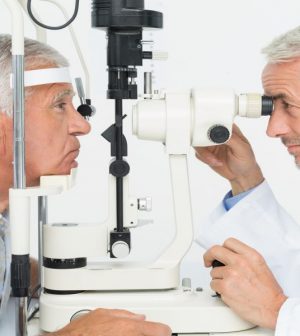- Are You Making This Expensive Thermostat Error This Winter?
- Recognizing the Signs of Hypothyroidism
- 10 Strategies to Overcome Insomnia
- Could Artificial Sweeteners Be Aging the Brain Faster?
- Techniques for Soothing Your Nervous System
- Does the Water in Your House Smell Funny? Here’s Why
- Can a Daily Dose of Apple Cider Vinegar Actually Aid Weight Loss?
- 6 Health Beverages That Can Actually Spike Your Blood Sugar
- Treatment Options for Social Anxiety Disorder
- Understanding the Connection Between Anxiety and Depression
Vision Problems? Here’s a Guide to Which Specialist Is Right for You

If you’re having eye problems, you may not know which type of specialist to consult.
Here’s some help from experts who explain the roles of an optometrist, ophthalmologist, pediatric ophthalmologist, orthoptist and optician.
Optometrists provide comprehensive eye care, including evaluations for glasses and contact lenses and common eye diseases.
“They play a role in monitoring chronic conditions such as cataracts, glaucoma, macular degeneration and diabetes,” Dr. Danielle Natale, an optometrist at the Krieger Eye Institute in Baltimore, said in an institute news release. They can also treat acute eye problems such as pink eye or sties.
Ophthalmologists are physicians who have completed four years of medical school and four years of residency training. They diagnose and treat eye diseases and prescribe eyeglasses and contact lenses, and they also perform eye surgery.
A pediatric ophthalmologist is specially trained to examine and treat children of all ages and abilities — especially those who are unable or too young to read the letters on an eye chart.
“To make the environment more child-friendly, ophthalmologists will often play games with the patients or show them movies during their exam,” said pediatric ophthalmologist Dr. Samantha Feldman, who also practices at the Krieger Eye Institute.
Orthoptists aren’t common, with only about 400 in the United States. They aren’t doctors, according to the American Association of Certified Orthoptists. But orthoptists are uniquely skilled in diagnosis and assist physicians in providing surgical and nonsurgical treatment for eye disorders, with an emphasis on binocular vision and eye movements.
They typically help with conditions such as strabismus, amblyopia, and double vision. Treatments they help administer include patching therapy, prisms and convergence exercises. They help evaluate patients of all ages, but most often children.
Opticians, who also are not doctors, don’t treat or diagnose eye conditions. They design and fit eyeglass lenses and frames for patients according to prescriptions from ophthalmologists and optometrists.
More information
Prevent Blindness has more on eye care.
SOURCE: Krieger Eye Institute/LifeBridge Health, news release, Jan. 8, 2021
Source: HealthDay
Copyright © 2026 HealthDay. All rights reserved.










